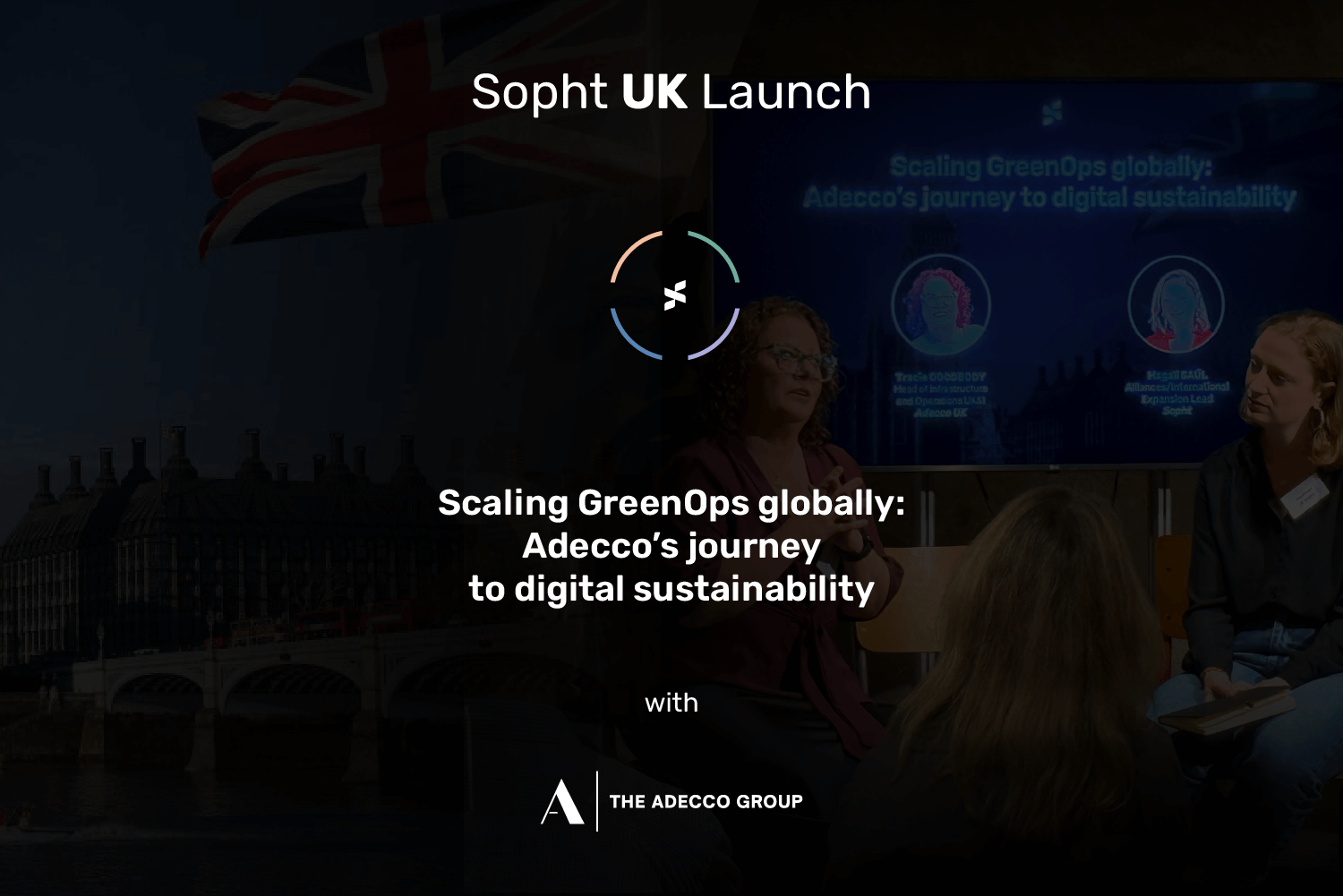In a recent panel discussion during Sopht’s UK Launch, leaders from Adecco and Sopht explored how to scale GreenIT initiatives across international companies, the necessity of building a collaborative ecosystem, and the often-overlooked link between environmental actions and cost savings.
Why Sustainable IT Matters Now
Tracie, Head of Infrastructure and Operations at Adecco UK and Ireland, kicked off the discussion by addressing the unique challenge of driving IT sustainability within a global organization spanning 62 countries with approximately 60,000 employees.
When asked why sustainable IT is such a priority, Tracie emphasized both personal and professional motivations: “It’s not going away. We need to do our bit.” She highlighted that with technologies like AI “gathering pace quicker than anybody can keep up with,” organizations must act now to make data-driven decisions that balance environmental impact with commercial viability.
Building Momentum Through Governance
Adecco’s GreenIT journey began in France, driven by Tracie’s manager who has been working with Sopht for several years. The French business successfully demonstrated both sustainability improvements and cost savings, creating a compelling case for expansion.
“Because they have been working with the French business, they have been able to demonstrate the IT sustainability choices they have made,” Tracie explained. The plan is to roll out across Europe next year, with the UK eager to join the initiative.
From Measurement to Action
While Adecco UK has already taken IT sustainability steps such as removing legacy network equipment from 75 branches and reducing their printer estate, Tracie emphasized the critical importance of measurement: “You can’t measure what you don’t know other than it is the right thing to do.”
The ability to demonstrate impact through data will transform how IT is perceived within the company. “If I can prove that we can also save money as well… it’s about having that data, knowing why you make decisions and measuring the impact of these decisions.”
The Commercial Case for IT Sustainability
Tracie made a compelling argument for why businesses should prioritize sustainable IT: “If I can demonstrate that a sustainable action not only balances the environment but also leads to savings, any business would be crazy not to do it, right?”
This dual benefit is increasingly important as sustainability requirements appear in international RFPs and as organizations set internal KPIs. Starting next year, Adecco will implement sustainability-linked incentives globally, demonstrating the strategic importance of these initiatives.
Looking Ahead
As Adecco embarks on its UK rollout, Tracie is particularly interested in how data will challenge assumptions.
Her final message was clear: “Sustainability is a hot topic in our business. It’s not only an IT problem, it’s a business problem.” By making sustainability a commercial partnership and demonstrating measurable impact, organizations can drive meaningful change while supporting business objectives.
Share this article on social media
In a recent panel discussion during Sopht’s UK Launch, leaders from Adecco and Sopht explored how to scale GreenIT initiatives across international companies, the necessity of building a collaborative ecosystem, and the often-overlooked link between environmental actions and cost savings.
Why Sustainable IT Matters Now
Tracie, Head of Infrastructure and Operations at Adecco UK and Ireland, kicked off the discussion by addressing the unique challenge of driving IT sustainability within a global organization spanning 62 countries with approximately 60,000 employees.
When asked why sustainable IT is such a priority, Tracie emphasized both personal and professional motivations: “It’s not going away. We need to do our bit.” She highlighted that with technologies like AI “gathering pace quicker than anybody can keep up with,” organizations must act now to make data-driven decisions that balance environmental impact with commercial viability.
Building Momentum Through Governance
Adecco’s GreenIT journey began in France, driven by Tracie’s manager who has been working with Sopht for several years. The French business successfully demonstrated both sustainability improvements and cost savings, creating a compelling case for expansion.
“Because they have been working with the French business, they have been able to demonstrate the IT sustainability choices they have made,” Tracie explained. The plan is to roll out across Europe next year, with the UK eager to join the initiative.
From Measurement to Action
While Adecco UK has already taken IT sustainability steps such as removing legacy network equipment from 75 branches and reducing their printer estate, Tracie emphasized the critical importance of measurement: “You can’t measure what you don’t know other than it is the right thing to do.”
The ability to demonstrate impact through data will transform how IT is perceived within the company. “If I can prove that we can also save money as well… it’s about having that data, knowing why you make decisions and measuring the impact of these decisions.”
The Commercial Case for IT Sustainability
Tracie made a compelling argument for why businesses should prioritize sustainable IT: “If I can demonstrate that a sustainable action not only balances the environment but also leads to savings, any business would be crazy not to do it, right?”
This dual benefit is increasingly important as sustainability requirements appear in international RFPs and as organizations set internal KPIs. Starting next year, Adecco will implement sustainability-linked incentives globally, demonstrating the strategic importance of these initiatives.
Looking Ahead
As Adecco embarks on its UK rollout, Tracie is particularly interested in how data will challenge assumptions.
Her final message was clear: “Sustainability is a hot topic in our business. It’s not only an IT problem, it’s a business problem.” By making sustainability a commercial partnership and demonstrating measurable impact, organizations can drive meaningful change while supporting business objectives.


